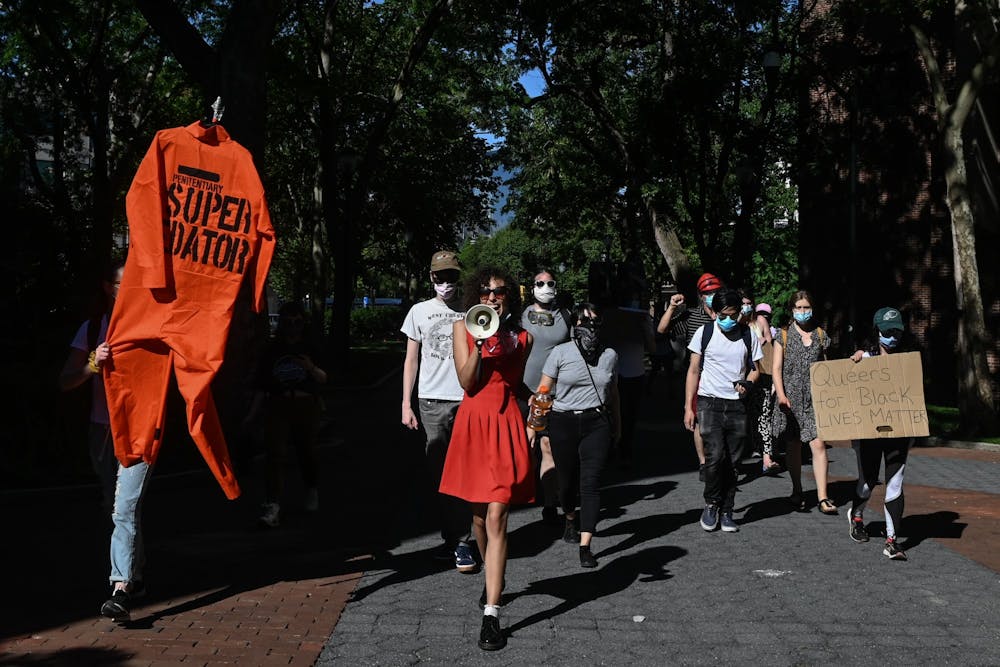A group of over 20 protesters marched from LOVE Park to Penn's College Green on Saturday evening, two weeks after the George Floyd protests began in Philadelphia, and primarily demanded the University divest from the Philadelphia Police Department.
The demonstration, which was mostly comprised of Penn students and alumni, was organized by 2017 Graduate School of Education and 2016 College graduate Zoe Sturges, who is now a kindergarten teacher at Mastery Clymer Elementary School in North Philadelphia.
Sturges said she was inspired to organize this Penn-specific protest after she was arrested while attempting to hand out flowers to members of the National Guard during protests in Philadelphia last week. She said she hoped the protest on campus would push the University to reallocate its funding of local police departments toward Black-run organizations and Philadelphia public schools.
“In 2020, Penn stands with and funds the police who are beating up students peacefully protesting legalized murder,” Sturges said to the group at the end of the demonstration.
The demonstration began at 4:15 p.m. at the LOVE Park in Philadelphia's John F. Kennedy Plaza. The group gathered and walked along Market Street, where cars honked in support while protesters shouted chants including “Quit your jobs!” and “No justice! No peace! Defund the police!”
The chants continued until the protesters reached Locust Walk and arrived at the Benjamin Franklin statue in the middle of the College Green.

Demonstrators placed signs and an orange prison jumpsuit on the Benjamin Franklin statue.
The demonstrators then congregated in a circle in front of the statue, where second-year masters student in mental health counseling Lydia Ramharack and Sturges spoke about their personal experiences with Penn Police and racial inequality at the University.
RELATED:
Thousands petition U. to cut ties with Philly PD, reform militarized campus 'police state'
Thousands of activists march through Philadelphia protesting police murder of George Floyd
“I don't trust [the Philadelphia police], and every time I see them I get pretty enraged,” Ramharack said. “I do my best to avoid them when I’m not protesting, and my best to try to make them mad that I am protesting.”
Ramharack and Sturges also called on Penn President Amy Gutmann and the administration to defund local police.
“What I would want [Penn] to do is actually divest from the police, stop the private police that they’re funding, don’t give the Philadelphia Police Foundation any more money, and then use that money to invest in city schools instead," Ramharack said to the crowd.
They said Penn students need to continue to put pressure on Gutmann, the University Board of Trustees, and Philadelphia local representatives to create substantial improvements both within the University and in the surrounding West Philadelphia communities.
The protest comes weeks after School of Social Policy & Practice professor Toorjo Ghose created a petition demanding the University halt its continuous support of a “violent police state” on Penn's campus and cease its relationship with the Philadelphia Police Department, in addition to a number of other demands. The petition now has over 12,200 signatures.
In addition to divestment from local police, Sturges said the University should fire professors who have made racist comments in the past. Though she did not mention the professors by name, she referenced a controversial statement made by Penn Law professor Amy Wax in 2018 who said that America will be “better off with more whites and fewer nonwhites.”
Throughout the march, Sturges carried an orange prison jumpsuit on wooden sticks with the Penn crest and the word “superpredator” written on the front, which she then taped to the Benjamin Franklin statue while other protesters laid their own signs in front of the statue.
Sturges said she wanted the jumpsuit to serve as a reminder of the Superpredator theory, which was coined by current Penn political science professor John DiIulio. The theory is centered around a prediction that DiIulio made in the 1990s, concluding from his research that juvenile crime would skyrocket in the early 2000’s because of an influx of “radically impulsive, brutally remorseless” young people in the streets.
Audrey Bloom, a friend of Sturges and a 2017 College graduate, traveled from her home in Pittsburgh to participate in the protest. Bloom said Sturges, who is Black, was treated differently by Penn professors than herself and many of her white peers on several occasions while attending the University.
“I am absolutely ashamed when people ask me which school I went to,” Bloom said. “What I want out of this school is to fund actual social change instead of oppressive regimes.”









